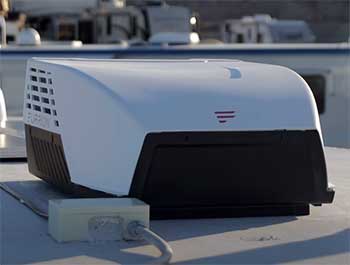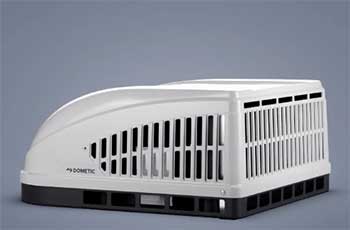When it comes to keeping your RV cool during hot summer months, having a reliable air conditioning unit is essential. Two of the most popular brands of RV air conditioners are Furrion and Dometic.
But which one is better suited for your RVing needs?
In this detailed comparison guide, we’ll examine the key features, pros and cons of Furrion and Dometic AC units to help you decide which is the right choice for your RV.
A Brief Comparison Table
Now that we’ve provided an overview of both brands, let’s compare some of the key features and specifications side-by-side:
| Features | Furrion | Dometic |
| BTU Cooling Output | 13,500 to 15,000 BTU | 10,000 to 15,000 BTU |
| Air Flow Volume | Up to 485 CFM | Up to 320 CFM |
| Fan/Compressor Warranty | 2 years | 2 years |
| Weight | Under 100 lbs | 65 – 100 lbs |
| Low Profile Height | 14″ – 15” | 14” – 18” |
| Noise Level | 54 – 56 dBA | 56 – 60 dBA |
| Ducted Options | Yes | Yes |
| Non-Ducted Options | Yes | Yes |
| Compressor Type | Single stage | Single or two stage |
| Thermostats | Basic or WiFi app control | Basic, LCD or WiFi app |
| Price Range | $800 – $1500 | $600 – $2000 |
Both Furrion and Dometic offer ducted and non-ducted AC systems in the common 13,500 to 15,000 BTU cooling capacity range. Weight and low profile height are comparable.
Furrion ACs tend to have a bit more air flow volume and lower noise levels. Dometic offers a wider range of BTU capacities and more advanced compressor and thermostat options. Dometic’s higher end models with variable speed compressors also come at higher price points.
Overall the general specs and cooling performances are quite similar between appropriately matched models. Installation considerations for your specific RV may be more important in determining which brand works best.
Key Takeaways:
Both Furrion and Dometic make high quality, reliable air conditioners for RVs. There is no one “best” brand overall.
- Furrion ACs excel at air flow volume and quiet operation. They are easy to install and control via app.
- Dometic offers a wider range of BTU capacities and advanced features like variable speed compressors and smart thermostats. They also have an extensive dealer network for service.
- For simplicity and noise reduction, Furrion units are ideal. For maximum climate control options, Dometic is preferable.
- Properly sizing your AC unit based on RV size is crucial. Choose an AC with enough cooling power for your interior square footage.
- Consider your needs for noise, climate control, installation difficulty, and dealer support when selecting between the two brands.
- Both Furrion and Dometic provide ducted and non-ducted AC systems to suit different RV types.
- Review AC BTU ratings, dimensions, air flow, warranty and other specs carefully before purchasing.
Overview of Furrion RV Air Conditioners
Furrion is a relatively new player in the RV appliance market, but they’ve quickly made a name for themselves with their innovative AC units designed specifically for RVs. Some of the standout features of Furrion AC units include:

- Quiet operation: Furrion uses swept wing fan technology and isolated compressor compartments to reduce noise. This makes their AC units among the quietest in the RV industry.
- Lightweight, low-profile design: Weighing under 100 pounds, Furrion’s ACs are engineered for easy installation on RVs. The units sit low on the roof and have aerodynamic profiling to minimize drag.
- Ducted and non-ducted options: Furrion offers both ducted central AC systems as well as non-ducted roof top units. The non-ducted units allow for quicker DIY installation.
- Universal mounting: Furrion AC shrouds use a universal mounting footprint so they can easily replace existing units from Dometic or Coleman without modification.
- Improved air flow: Furrion’s ACs utilize optimized fan blade angle and depth to improve air flow volume and cooling capacity.
Some of the most popular Furrion AC units include the low-profile FAFA13XL2 roof top AC and the ducted FACR15SA chassis AC system.
One downside is that Furrion’s product line is still limited compared to established brands like Dometic.
Overview of Dometic RV Air Conditioners
With over 60 years experience making ACs for RVs, Dometic is one of the most trusted names in RV cooling. Some of Dometic’s popular features include:
- Variable speed compressor: Dometic’s Brisk II ACs use a variable speed compressor that adapts cooling output based on heat load. This improves efficiency and reduces cycling.
- Ducted and non-ducted options: Dometic has a vast range of ducted and non-ducted AC systems in various sizes and BTU capacities to cool RVs of all types.
- Advanced controllers: Dometic offers LCD display comfort control centers and smartphone apps for monitoring and controlling temperatures precisely.
- Quiet and low-profile: Noise reduction technologies make Dometic units among the quietest in the industry. Low-profile designs sit flush on the RV roof.
- Universal mounting: Dometic ACs use standardized mounting footprints for easy upgrading or replacement of existing AC units.
Some of Dometic’s most popular models are the 15K BTU Penguin II Low Profile roof top AC and the ultra-quiet FreshJet series ducted AC systems. The extensive product range includes units specifically optimized for 5th wheels, travel trailers, truck campers and more.
Pros and Cons of Furrion RV Air Conditioners
Furrion AC Pros:
- Excellent air flow volume for quick cooling
- Low decibel noise ratings reduce annoying fan noise
- Lightweight, aerodynamic profile minimizes drag and fuel efficiency losses
- Universal mounting fits many existing RV roof openings
- WiFi app allows remote monitoring and climate control
Furrion AC Cons:
- Limited BTU range and model options
- Not as many dealer locations for service and repairs
- Basic single stage compressor without variable output
- Short 2 year warranty period
- App functionality can be buggy
Pros and Cons of Dometic RV Air Conditioners
Dometic AC Pros:

- Huge range of BTU capacities from 10K to 15K for optimal cooling
- Advanced variable speed compressors improve efficiency
- LCD and smartphone thermostat controls for precise management
- Extensive dealer network provides good service and support
- Reliable performance backed by long history in RV industry
Dometic AC Cons:
- Noise levels and airflow volume ratings not as strong as Furrion
- Cooling ducts may reduce performance in ducted models
- Complex control panels can be frustrating and unintuitive
- App connectivity issues and glitches reported by some users
- Older models may lack features of newer competitors
So in summary, Furrion ACs tend to excel at air flow and quiet operation, while Dometic offers unmatched range and advanced compressor tech.
Furrion advantages may appeal more to DIY RV owners looking for easy installation, while long term RVers may benefit more from Dometic’s dealer network and climate control options.
Also Read: Issues With Coachmen Sportscoach RV.
FAQs on Furrion and Dometic RV Air Conditioners
There is no definitive “better” brand between Furrion and Dometic. Both offer high quality, reliable air conditioning for RVs. Furrion has advantages in noise level and air flow. But Dometic ACs come in a wider range of sizes and capacities. For advanced climate control features, Dometic systems with digital thermostats are preferable. But for simple operation and DIY installation, Furrion is easier to use.
The Dometic Brisk II 15K BTU AC unit is one of the highest rated and best selling RV air conditioners. It uses an efficient variable speed compressor and has 300+ 5 star reviews from satisfied RV owners. The Coleman Mach 15 is another top rated ducted AC at a more affordable price point.
No, Dometic and Furrion AC units are not interchangeable when it comes to thermostat controls. You need to use the proprietary thermostats that come with each brand. However, you can use a universal aftermarket thermostat with any AC brand by wiring it correctly.
For portable supplemental cooling in RVs, the top recommendations are the Honeywell MO08CESWB for smaller trailers, and the Frigidaire FHPC132AB1 for larger fifth wheels or travel trailers up to 550 square feet. Make sure to get a portable AC unit with good airflow and a ducting kit to maximize circulation.
Verdict: It Depends on Your Specific RV Cooling Needs
So to recap this extensive Furrion vs Dometic AC comparison:
If you prioritize noise reduction, airflow, ease of installation and simplicity, then Furrion air conditioners are a great choice.
If advanced climate control, maximum sizing flexibility, and service support are top concerns, then Dometic AC systems may be preferable for your RV setup.
At the end of the day, ensuring you get an AC unit properly sized for your RV’s floor plan is the most important factor, regardless of brand. Carefully measure the BTUs needed to effectively cool the interior air space.
Then choose a reputable AC brand that offers the right cooling capacity and features you need for comfortable RV trips.

